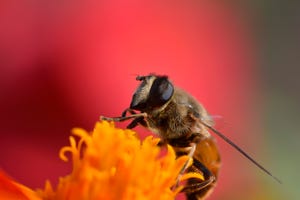
First Ever Honeybee Vaccine Approved to Target Deadly Disease - CNET
The US Department of Agriculture approved a vaccine for honeybees on Jan. 4 that could prevent further devastation to the insects, whose pollinating is key to the global food supply.
The vaccine, developed by Georgia-based biotech company Dalan Animal Health and manufactured by Diamond Animal Health, targets American Foulbrood, a widespread deadly disease caused by a bacteria known as Paenibacillus larvae. Prior to the vaccination, American Foulbrood was considered incurable, and the primary way to eliminate it was to incinerate affected hives. That means beekeepers would literally set hives on fire to kill infected bees and keep curbing the spread of the disease.
Such a drastic practice is usually the standard, and some states even enforce a burn-only policy that requires the burning of bees and equipment found to be infected with antibiotic-resistant American Foulbrood. Certain antibiotics can also be used to help combat the disease, but those antibiotics can’t fully solve the problem.
“This is an exciting step forward for beekeepers, as we rely on antibiotic treatment that has limited effectiveness and requires lots of time and energy to apply to our hives,” Trevor Tauzer, owner of Tauzer Apiaries and board member of the California State Beekeepers Association said in a statement.
To administer the novel vaccine — which contains killed whole cell Paenibacillus larvae bacteria — beekeepers can mix it into the feed the worker bees consume and then feed to the queen. Upon ingestion, the vaccine moves into her ovaries. As a result, this ensures immunity in any larvae the queen produces.
In the future, Dalan Animal Health says it intends to use the format of this vaccine to target other diseases honeybees face.
“Global population growth and changing climates will increase the importance of honeybee pollination to secure our food supply,” Dr. Annette Kleiser, CEO of Dalan Animal Health, said in the statement.”Our vaccine is a breakthrough in protecting honeybees. We are ready to change how we care for insects, impacting food production on a global scale.”

